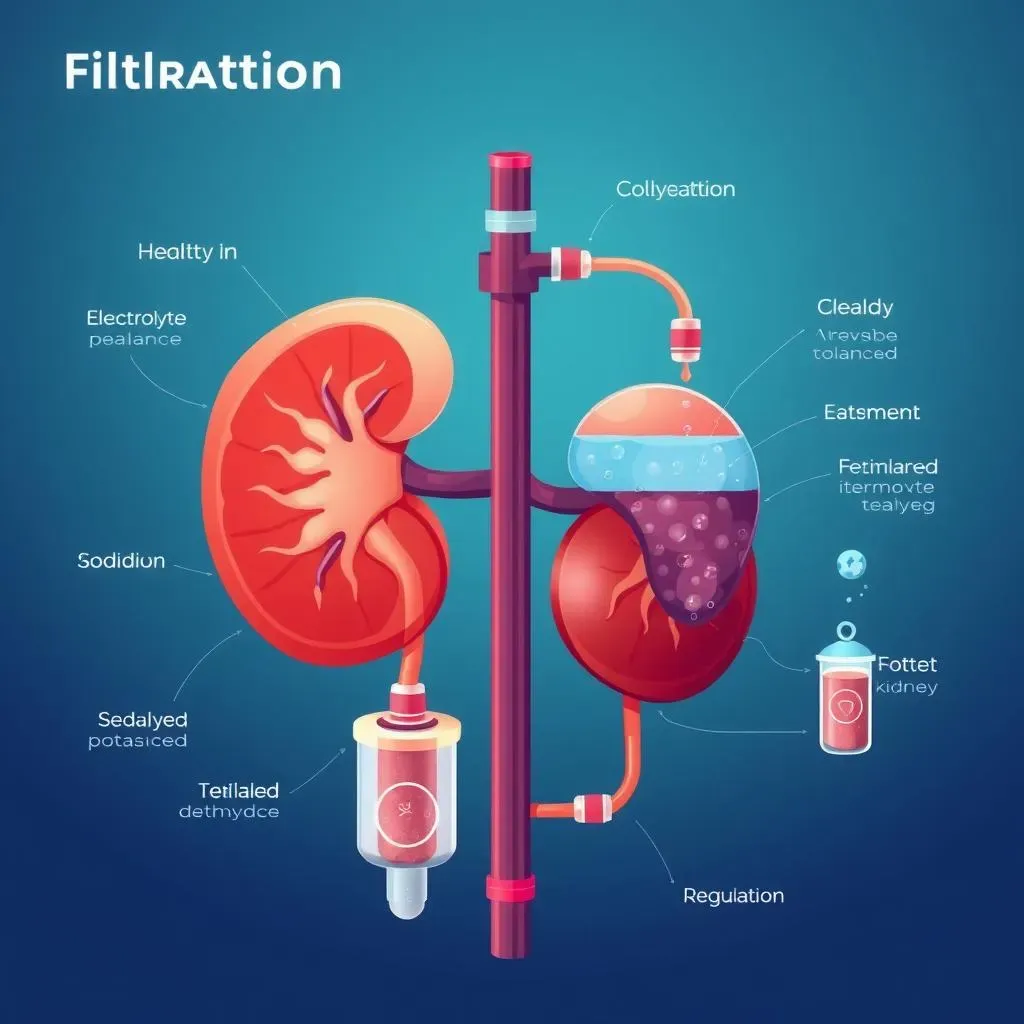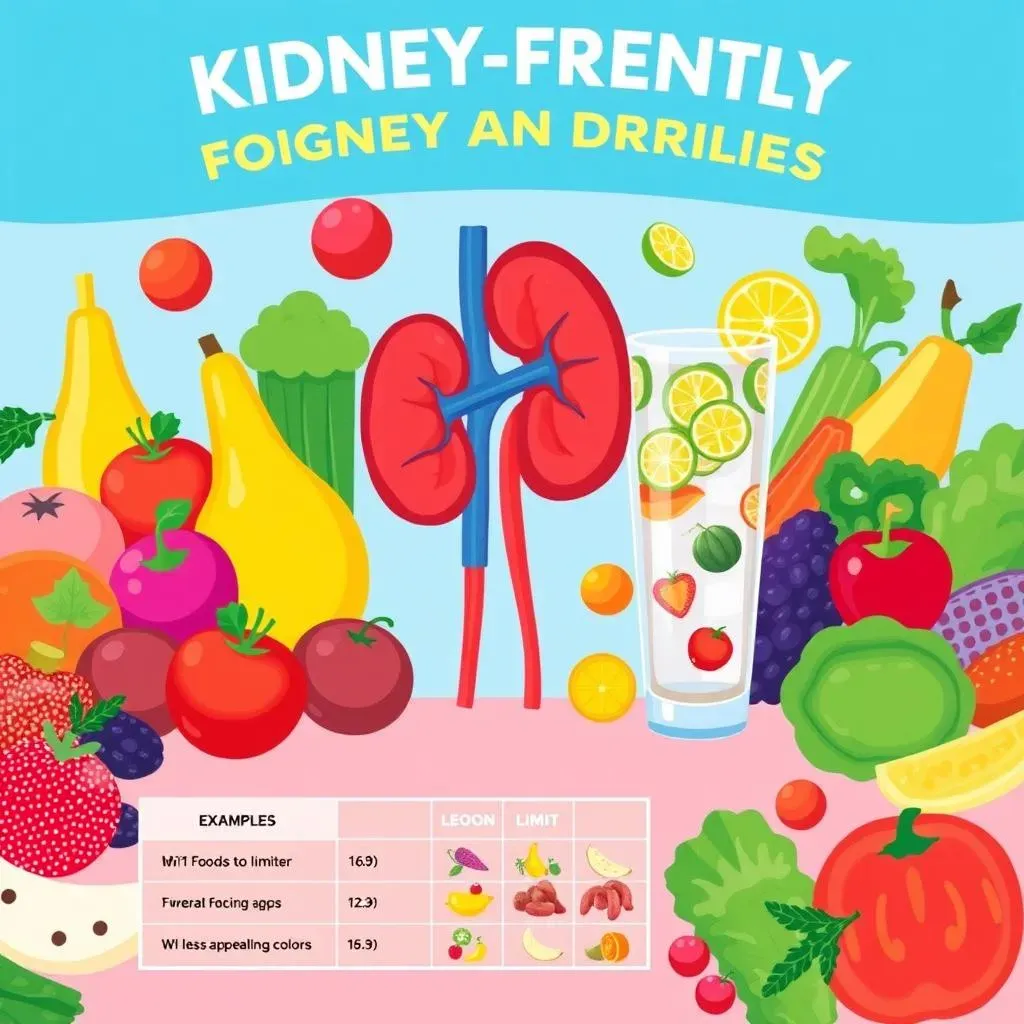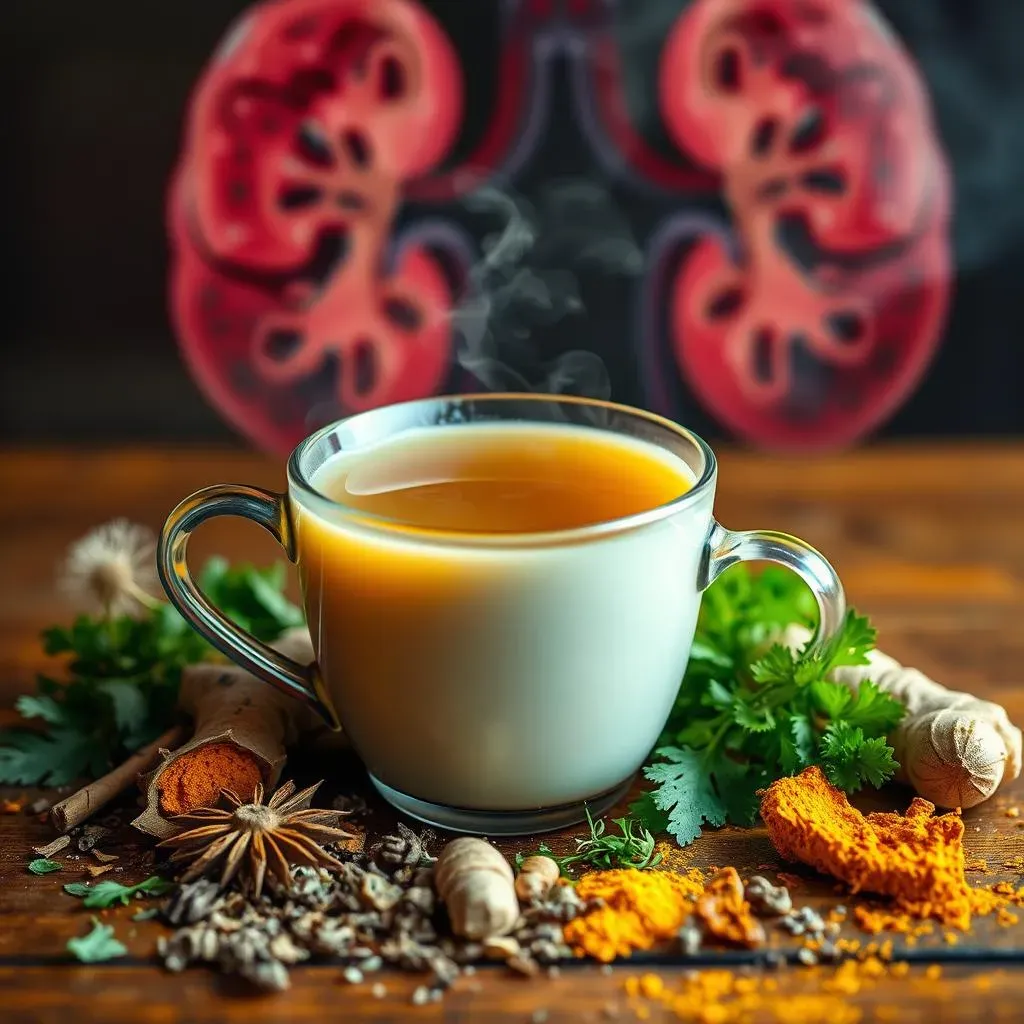Table of Contents
Our kidneys, those unsung heroes working tirelessly behind the scenes, filter waste, balance electrolytes, and even help produce hormones. But what if they need a little boost? That's where the buzz around a kidney detox tea comes in. Are these teas a legitimate way to cleanse and support kidney function, or just another health fad? This article cuts through the noise, offering a grounded look at how to naturally support your kidneys. We'll explore the power of hydration, the impact of food choices, and the truth about detox teas. Forget quick fixes and miracle cures. We're diving into practical, sustainable strategies for kidney health. From understanding which foods lend a helping hand to crafting your own kidney-friendly lifestyle, you'll gain the knowledge to make informed choices. So, grab a glass of water (it's the ultimate kidney cleanser, after all) and let's explore the world of natural kidney support, debunking myths and uncovering evidence-based practices along the way.
Understanding Kidney Function and the Need for Detox

Understanding Kidney Function and the Need for Detox
The Kidney's Vital Role: More Than Just Waste Disposal
Think of your kidneys as the body's ultimate filtration system, working around the clock to keep things running smoothly. They're not just about getting rid of waste; they're also master balancers, regulating electrolytes like sodium, potassium, and calcium. These electrolytes are crucial for nerve function, muscle contractions, and maintaining a stable blood pressure. Plus, kidneys produce hormones that stimulate red blood cell production and help keep your bones strong. So, yeah, they're kind of a big deal.
But here's the thing: our modern lifestyles can put a strain on these hard-working organs. Processed foods, sugary drinks, and even certain medications can create a build-up of toxins and metabolic byproducts that the kidneys have to deal with. When they're constantly overloaded, their efficiency can decrease, potentially leading to a range of health problems down the line. That's where the idea of supporting kidney function comes in, although the term "detox" can be a bit misleading.
What Does "Kidney Detox" Really Mean?
Let's be real: the term "detox" gets thrown around a lot, often with promises that sound too good to be true. When it comes to kidneys, a true "detox" isn't about some magical cleanse that completely resets your system. Instead, it's about providing your kidneys with the right tools and environment to do their job effectively. This means focusing on hydration, a balanced diet, and avoiding things that can harm kidney function. It's about supporting their natural ability to filter and regulate.
Factors That Can Impact Kidney Health
Several factors can impact your kidney health. Dehydration is a big one, as water is essential for flushing out waste products. A diet high in sodium, processed foods, and red meat can also put extra stress on the kidneys. Certain medical conditions, like diabetes and high blood pressure, are major risk factors for kidney disease. Even over-the-counter pain relievers, when taken in excess, can be harmful. Being mindful of these factors and making proactive choices can go a long way in protecting your kidney health.
Consider this: imagine your kidneys are like a car engine. If you constantly run it on low-quality fuel and never change the oil, it's not going to perform well for very long. Similarly, if you consistently overload your kidneys with unhealthy substances and don't provide them with the necessary support, their function will inevitably suffer. Taking steps to understand and address these factors is key to long-term kidney well-being.
Factor | Impact on Kidneys | What You Can Do |
|---|---|---|
Dehydration | Hinders waste removal, increases risk of kidney stones | Drink plenty of water throughout the day |
High Sodium Intake | Elevates blood pressure, puts strain on kidneys | Limit processed foods, read food labels carefully |
Diabetes | Damages blood vessels in the kidneys | Manage blood sugar levels, follow doctor's recommendations |
Exploring Natural Kidney Support: Foods and Drinks

Exploring Natural Kidney Support: Foods and Drinks
Hydration: The Foundation of Kidney Health
so we've established that kidneys are vital. Now, let's talk about the simplest, yet most powerful tool for keeping them happy: hydration. Water isn't just some trendy beverage; it's the lifeblood of kidney function. Think of it as the ultimate cleaning solution, flushing out waste products, preventing the formation of kidney stones, and keeping those delicate filtration systems running smoothly. How much do you need? The general recommendation is around 8 glasses a day, but it really depends on your activity level, climate, and overall health. If you're sweating buckets during a workout, you'll need more. And if you're dealing with certain medical conditions, your doctor might have specific recommendations.
Not a fan of plain water? No problem! Get creative. Infuse your water with slices of cucumber, lemon, or berries for a refreshing twist. Herbal teas, like chamomile or hibiscus, can also contribute to your daily fluid intake. Just be mindful of added sugars and caffeine, as those can have a negative impact on kidney health. The key is to make hydration a consistent habit, not just something you do when you're feeling thirsty. Keep a water bottle handy, set reminders on your phone, and find ways to make it enjoyable. Your kidneys will thank you for it!
Foods That Love Your Kidneys Back
Beyond hydration, what you eat plays a massive role in kidney health. A heart-healthy diet, rich in fruits, vegetables, and lean proteins, is generally kidney-friendly. These foods are naturally low in sodium and processed ingredients, which helps reduce the workload on your kidneys. Specific foods, like cranberries, have been shown to help prevent urinary tract infections (UTIs), which can sometimes lead to kidney infections. Grapes are packed with antioxidants that combat inflammation and oxidative stress, both of which can damage kidney cells. And don't forget calcium-rich foods like leafy greens and yogurt. While too much calcium can contribute to kidney stones in some people, moderate intake is essential for overall health and may even help prevent certain types of kidney stones.
However, it's not just about adding "good" foods; it's also about limiting the "bad" ones. Processed foods, with their high sodium and phosphate content, can be particularly hard on the kidneys. Red meat, when consumed in excess, can also contribute to kidney problems. And sugary drinks? They're basically a triple threat, increasing the risk of obesity, diabetes, and kidney disease. So, focus on building a balanced plate with plenty of whole, unprocessed foods. Your kidneys (and the rest of your body) will reap the rewards.
Food Group | Kidney-Friendly Choices | Foods to Limit |
|---|---|---|
Fruits | Berries, grapes, apples | Dried fruits (high in sugar) |
Vegetables | Leafy greens, cauliflower, bell peppers | Canned vegetables (high in sodium) |
Proteins | Lean poultry, fish, beans | Red meat, processed meats |
Kidney Detox Tea: Benefits, Risks, and Recipes

Kidney Detox Tea: Benefits, Risks, and Recipes
The Allure of Kidney Detox Tea: What's the Hype?
so you've probably seen those ads promising a complete kidney reset with just a few sips of tea. Let's get real: the term "detox" is often used loosely, and kidney detox teas are no exception. The idea behind these teas is that certain herbs and ingredients can help flush out toxins, reduce inflammation, and support overall kidney function. Some common ingredients include dandelion root, parsley, ginger, and turmeric, each touted for its potential health benefits. Dandelion root, for instance, is believed to be a diuretic, increasing urine production and helping to eliminate waste. Parsley is another popular choice, known for its antioxidant properties. But before you start brewing a giant pot, let's take a closer look at the actual evidence.
While some studies suggest that certain herbs may have beneficial effects on kidney health, the research is often limited and not always conclusive. Plus, the concentration of these herbs in detox teas can vary widely, making it difficult to determine their true effectiveness. It's also important to remember that everyone's body reacts differently to herbs and supplements. What works for one person might not work for another, and some ingredients can even interact with medications you're already taking. So, while kidney detox teas might seem like a harmless way to give your kidneys a little love, it's crucial to approach them with a healthy dose of skepticism and do your research.
Navigating the Risks: What You Need to Know
Now for the not-so-glamorous side of kidney detox teas. While many ingredients are generally considered safe, some can pose potential risks, especially for individuals with pre-existing kidney conditions. For example, excessive consumption of diuretics can lead to dehydration and electrolyte imbalances, which can actually put extra stress on the kidneys. Certain herbs, like licorice root, can raise blood pressure, which is a major concern for people with hypertension or kidney disease. And in rare cases, some herbal ingredients have been linked to kidney damage.
The bottom line? It's always best to err on the side of caution. If you have any kidney problems, are taking medications, or are pregnant or breastfeeding, talk to your doctor before trying any kidney detox tea. They can help you assess the potential risks and benefits based on your individual health profile. And even if you're generally healthy, it's wise to start with small amounts and pay attention to how your body reacts. Discontinue use if you experience any adverse effects, such as nausea, dizziness, or changes in urine output. Remember, your kidneys are delicate organs, and it's important to treat them with respect.
Ingredient | Potential Risks |
|---|---|
Dandelion Root | May cause allergic reactions in some individuals, can interact with certain medications |
Licorice Root | Can raise blood pressure, may cause fluid retention |
High amounts of diuretics | Leads to dehydration and electrolyte imbalances |
Crafting Your KidneyFriendly Lifestyle: Diet, Hydration, and More

Crafting Your KidneyFriendly Lifestyle: Diet, Hydration, and More
Embrace the Power of Consistent Hydration
We've hammered on hydration, but it's worth repeating: consistent hydration is non-negotiable for kidney health. Don't wait until you're parched to reach for a glass of water. Make it a conscious habit throughout the day. Carry a reusable water bottle, set reminders on your phone, and find creative ways to make it enjoyable. Experiment with infused water recipes, explore different herbal teas, and track your fluid intake to ensure you're meeting your daily needs. This isn't just about quenching your thirst; it's about providing your kidneys with the essential support they need to function optimally.
Think of your kidneys as a garden. If you don't water your plants regularly, they'll wither and die. Similarly, if you don't provide your kidneys with enough fluids, they'll struggle to filter waste and maintain electrolyte balance. So, make hydration a priority, just like you would with any other essential aspect of your health. Your kidneys will thank you for it with years of reliable service.
Dietary Habits for Kidney Support
Diet is not just about weight management; it's about fueling your body with the nutrients it needs to thrive. A kidney-friendly diet focuses on whole, unprocessed foods that are naturally low in sodium, phosphorus, and potassium. Load up on colorful fruits and vegetables, lean proteins, and whole grains. Limit your intake of processed foods, sugary drinks, and excessive amounts of red meat. Pay attention to food labels, and be mindful of hidden sources of sodium and phosphates. Cooking at home allows you to control the ingredients and portion sizes, making it easier to stick to a kidney-friendly eating plan.
It’s also important to consider portion control. Even healthy foods, when consumed in excess, can put a strain on your kidneys. So, practice mindful eating, pay attention to your hunger cues, and avoid overeating. Small, sustainable changes to your dietary habits can have a profound impact on your kidney health over time. It's about creating a long-term lifestyle, not just following a temporary diet.
Lifestyle Factor | Recommendation |
|---|---|
Hydration | Aim for at least 8 glasses of water daily, adjust based on activity level |
Diet | Focus on whole, unprocessed foods, limit sodium and phosphorus |
Exercise | Engage in regular physical activity, maintain a healthy weight |
Lifestyle Choices for Long-Term Kidney Well-being
Beyond diet and hydration, other lifestyle choices can significantly impact your kidney health. Regular exercise helps maintain a healthy weight, which reduces the risk of diabetes and high blood pressure, both major risk factors for kidney disease. Aim for at least 30 minutes of moderate-intensity exercise most days of the week. Getting enough sleep is also crucial, as sleep deprivation can disrupt hormone balance and impair kidney function. Aim for 7-8 hours of quality sleep each night. And of course, avoid smoking and excessive alcohol consumption, as these habits can damage your kidneys and increase your risk of kidney problems.
Stress management is another important aspect of kidney-friendly living. Chronic stress can elevate blood pressure and contribute to inflammation, both of which can harm your kidneys. Find healthy ways to manage stress, such as yoga, meditation, or spending time in nature. Cultivating a positive mindset and building strong social connections can also help buffer the effects of stress. Remember, your kidneys are part of a complex system, and taking care of your overall well-being is essential for their long-term health.
The Bottom Line: Supporting Your Kidneys Naturally
While the idea of a quick-fix kidney detox might be tempting, the most effective approach is embracing a kidney-friendly lifestyle. Forget the hype around specific cleanses; focus on consistent hydration, a balanced diet rich in fruits and vegetables, and steering clear of harmful habits. Whether or not you choose to incorporate a kidney detox tea into your routine, remember that it's just one piece of the puzzle. By prioritizing your overall health and consulting with a healthcare professional for any specific concerns, you'll be well on your way to keeping those vital organs happy and healthy for years to come. Ultimately, your kidneys will thank you for the long-term care, not a fleeting detox.